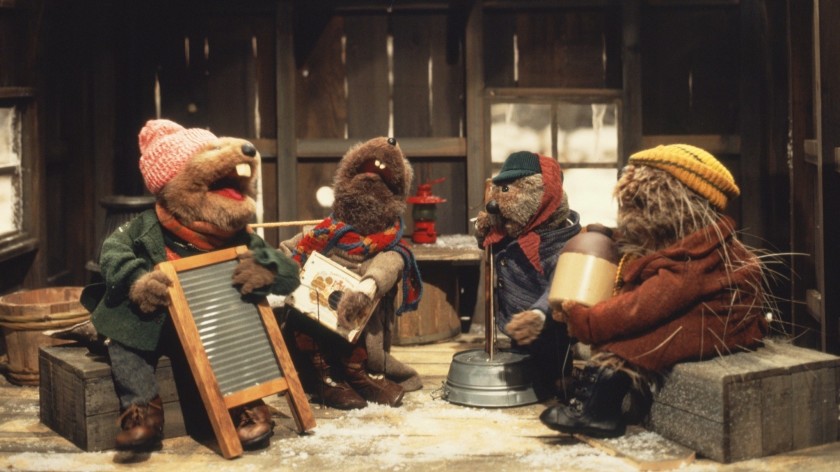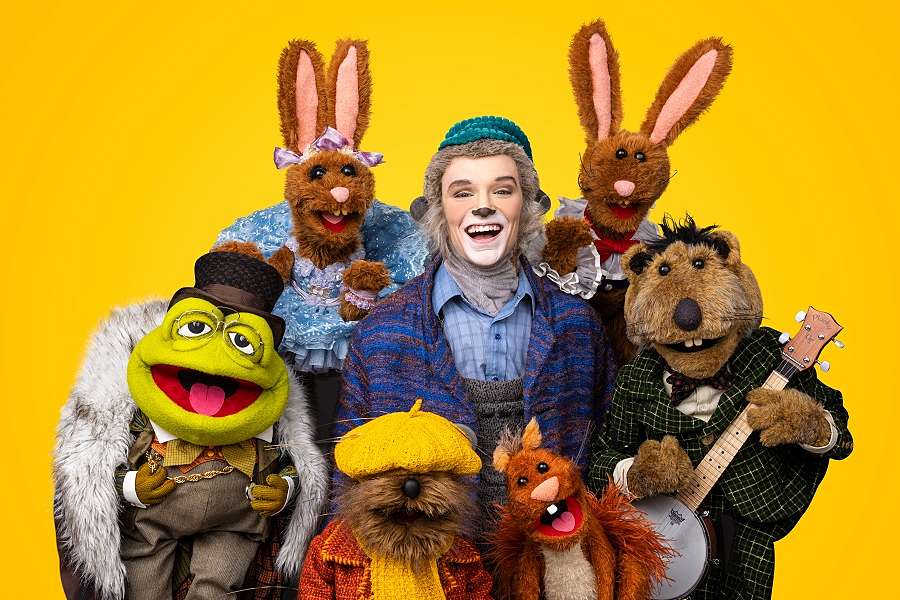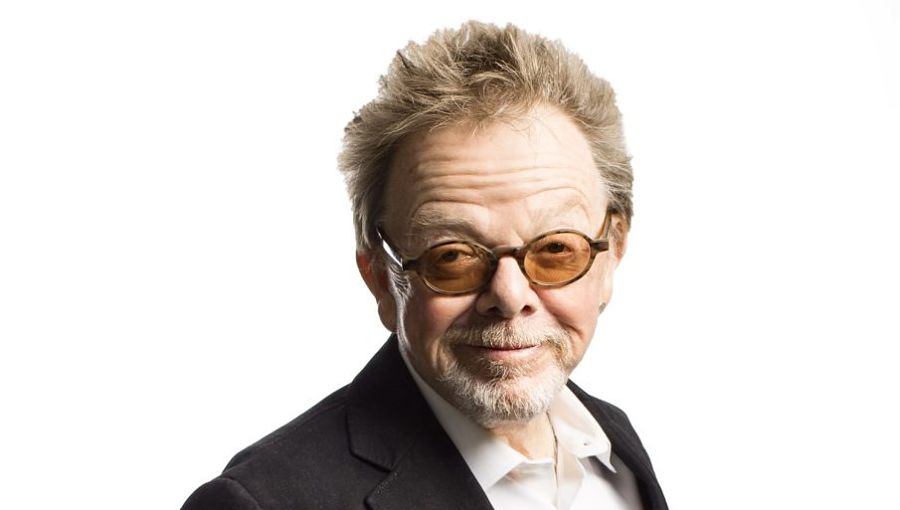I’ve always thought of songwriter Paul Williams as a sort of honorary Muppet, and not only because he (with co-writer Kenneth Ascher) contributed the iconic score for The Muppet Movie. With his shaggy blonde hair, diminutive stature, and bouncy, bemused affect, he fit into that famous ensemble of puppet people like few other humans ever have. Check out his first appearance on The Muppet Show to sing “An Old-Fashioned Love Song.” I mean:

Another of Williams’s collaborations with the Jim Henson Company was 1977’s Emmet Otter’s Jug-Band Christmas, a TV film made for CBC that later aired on HBO. I missed it on its first airing but discovered it in the 1990s thanks to a VHS copy passed along by a friend, and I’ve watched it every year since; it’s easily one of my favorite holiday perennials, and I’ve played “When the River Meets the Sea” at church. Based on Russell Hoban’s book, a bittersweet variation on “The Gift of the Magi,” it’s about a widowed otter and her young son getting presents for each other they can’t afford, with talent show prize money as their Hail Mary play. Henson’s rendering is gentle, ebullient, often wickedly funny, and meticulously made; the way Henson and his puppeteers give life to a small river community of anthropomorphic otters, hedgehogs, foxes, weasels, and assorted waterfowl is among the film’s abiding pleasures.
So are Williams’s songs, which freely sample gospel, ragtime, bluegrass, even glam rock. Now a new stage adaptation mixing live actors and puppets—with a book by Timothy Allen McDonald and Christopher Gattelli, who also directs—is arriving at New Victory Theater in New York City for a holiday run (Dec. 10-Jan. 2, 2022), after a 2009 staging at Connecticut’s Goodspeed Opera House. I’ll be there with jingle bells on, of course. In the meantime, I had a chance to speak to Williams, who started out in show business as a child actor, and whose arrival as a writer for the theatre seems long overdue (but not for lack of trying).
ROB WEINERT-KENDT: I should know this, but I don’t: Have you had stage work produced in New York before?
PAUL WILLIAMS: Not really. I’ve got an unproduced musical I’m working on with Gustavo Santaolalla of Pan’s Labyrinth, with Guillermo del Toro, but everything came to a sliding halt in the last couple of years, of course. But the theatrical experience of mine that has had the greatest success has to be Bugsy Malone, and that’s been more in the United Kingdom. I don’t know if you’re familiar with that…
Oh, yeah. I’m the ideal age for your work; I grew up on this stuff.
Well, it keeps going, you know, with new generations. What’s wonderful is that the things I did in the 1970s or early ’80s that were not successful seemed to create fans that over the years would show up and say, “Let’s do something together,” whether it’s Edgar Wright with Baby Driver or Daft Punk, who saw Phantom of the Paradise in Paris 20 times. I never call something a failure; it’s on a back burner, and all of a sudden, eventually something wonderful will happen.
I have a very Jiminy Cricket philosophy about life, especially with anything involving Jim Henson. It was just a magical relationship with the whole family through so much of my life. It started out with just Jim going, “Hey, you want to do this?” It’s kind of an Americana story, a sweet little book that became a one-hour special. I met with Jim and said, “It’s interesting, I keep getting hired to write things I know nothing about.” Have you ever seen Emmet Otter?
It’s one of my favorite things. Can you talk a bit about why you think it’s special?
The fact is that in anything I did with with Jim, and hopefully anything that I really connect with, the songs come out of the story and the characters. The major mistake I’ve seen many pop songwriters who try to work in theatre make is they try to write a hit song. I seem to be able, not only in theatre, to have a spell where I won’t write a hit song but I’ll write something like Emmet Otter or The Muppet Movie or Bugsy Malone, where I just fall in love with the characters.

Among the writers of your generation, it does seem like you’d be well suited to write for the stage; Randy Newman is another. So it’s gratifying to see it happen for you.
One of my dear friends through the years was a guy named George Furth, who wrote Company, and George always said, “One of these days, you’re gonna settle down and start writing for the theatre.” And over the years I have. It’s the only thing that I’ve ever done where I know that the audience is a collaborator. I did a musical with Garry Marshall based on Happy Days. I wrote a song for Howard and Marion, and I was thinking, “Oh my God, this is wonderful, we’re talking Tony Awards”—and the audience went to the bathroom. It was just like, Jesus, how did I miss that so much? You get so much information back from the audience. It’s frustrating and it’s wonderful. And it’s not as dangerous as social media.
Apart from your appearance on The Muppet Show in 1976, was Emmett Otter the first thing you worked with Jim Henson on?
Yeah. I was a fan. I’d be out touring with my road band all over America, we’d hit all the spots in Wisconsin and Ohio and Kentucky, Vegas and the like, and wherever we were, the one thing that was a constant, you’d get up in the morning—if you actually woke up in the morning—and watch Sesame Street. I mean, I was a fan of Jim Henson’s before I knew they were Muppets; I’m talking back on Ed Sullivan. When I got a little bit of attention as a songwriter and started performing—I always tell people, I became better at showing off than showing up, but I had a great time—all of a sudden I’m getting on a plane to go to England to do The Muppet Show. And that was the first the first face-to-face meeting with all those amazing folks. There’s a line that Kenny Ascher and I wrote in The Muppet Movie for Gonzo, “There’s not a word yet for old friends who’ve just met,” and that is a perfect description of what it was like to walk onto a set with Dave Goelz and Jim Henson and Frank Oz. It was the best treehouse I ever played in.
When you were writing these songs, were you thinking of the characters as animals or puppets, or as just little people who happened to take the form of talking animals?

I think of them as otters and porcupines. I don’t think of them as some object at the end of somebody’s arm. There’s such an absolute, distinct personality. It’s been that way from the very beginning; I just don’t think about having a conversation with the human underneath the puppet, because that’s my buddy. Dave Goelz and I are friends, but Gonzo is like—there is a camouflaged wisdom. I take that back, it’s not wisdom; it’s kindness. There’s something in Gonzo that is just like—if I could be a little more like Gonzo and survive, I’d like to always be like that, to have that enthusiasm.
As I say, I’m very Jiminy Cricket about about life in general, and I think that metaphorically and realistically there is a lot of truth in the phrase, “I won’t grow up.” I won’t abandon that wistful, loving way. I mean, you look at the world right now and what’s going on, right now it’s really scary, between this crawling through glass with the loss of life and the virus, and the insanity of people refusing to hear each other and believe each other. It’s really easy to let yourself think, when is this going to end, and when is it going to come together where we can treat each other with a little kindness and allow everybody to have dignity? I know I’m off on a sidetrack.
I’m with you, keep going.
I think there’s something to be said for childlike belief. I just wrote a thing with Gustavo Santaolalla for Netflix, a series called Maya and the Three, and the song is basically about faith, hope, and courage, my companions in the night. It’s interesting to come up against a project you’re hired to write for that feels like an absolute fit for where you are in your life right now. We need to do anything we can to let young women around the world know that they’re powerful, they can do anything. To go back to Emmet Otter, it’s a play about having the courage to do something really, really dangerous, but they are brave enough to take the chance.
Can you tell me a little bit about this production? It has a new book, I know, but did you write some new songs as well?
Yeah, there are several new songs. One thing everyone has asked me through the years is, why isn’t there a full version of “Born in a Trunk”? So that’s in there, and there’s an opening song called “Waterville” where the mayor sings about what was so special about the town. There’s a song for Pop’s departed ghost called “Alice, Keep Dreaming.” What’s really wonderful is how well they seem to fit, and the part of the story that touched me still touches me as powerfully as it did when I first wrote it. Now with Tim McDonald and Chris Gattelli, the creative input comes pretty quickly and easy. There’s nothing like something being fun to keep you interested, you know? And if nothing else, there is the light of Jim Henson on every piece of this. He’s a presence, and will continue to be a presence for a batch of eternity.
Rob Weinert-Kendt (he/him) is editor-in-chief of American Theatre. rwkendt@tcg.org


